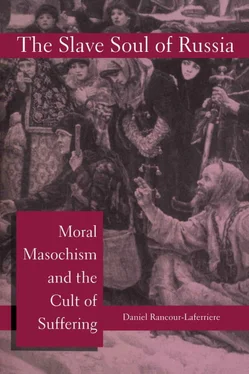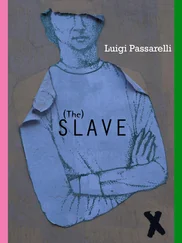The literary imagery of Russian self-abnegation can be wide-ranging, even flamboyant. It is hardly falsifiable (in the Popperian sense), but at the same time it is highly interesting. Take, for example, the Russian Symbolist poet Viacheslav Ivanov, who in his essay on “the Russian Idea,” declares: “our most attractive, most noble aspirations are imprinted with a thirst for self-destruction [zapechatleny zhazhdoiu samorazrusheniia].” “We” (Russians), Ivanov says, act as though other peoples are terribly stingy, and we try to prove ourselves a selfless people, a “self-immolating people,” a “butterfly-Psyche” longing for a fiery death. 6Ivanov uses the imagery of downward movement in an attempt to convey what he means. Russians have a “love for descent,” they are inclined to voluntary subordination of the will to another (as in the religious practice of washing another’s feet, or in the sectarian’s utterance “You are greater than I”). The “law of descent” (“zakon niskhozhdeniia”) is the essence of “Russian soul,” and the lowly, humiliated, but enlightening Christ is the perfect model for this Russian tendency. It is as if the words “imitation of Christ” (“upodoblenie Khristu”) were inscribed on the forehead of the Russian nation. It is as if Russians were born Christian: “Hic populus natus est christianus.” 7
These very heterogeneous images explain nothing, but they offer a treasure trove to the scholar seeking explanations. They make it easier to go about asking blunt questions: How do Russians endure their pain? What mental processes permit them to go on living even as they perceive themselves as victims? Might there be a widespread mentality which encourages their victimization? Do they have some secret need or wish to suffer, or even to destroy themselves? If so, what is the ontogenetic background to the wish in individual Russians? Why is the wish so difficult to dislodge?
These are psychological questions, and they have not been answered in any substantive fashion in the past. They are of particular interest to the psychoanalytically oriented scholar. Of course other scholars, too, have taken an indirect interest. Considerable historical, philosophical, political, anthropological, and sociological research has been devoted to patterns of exploitation, subjugation, and even self-destruction in Russia. But psychological, and in particular, psychoanalytic study has been very scarce.
What I am proposing to do here is to construct a psychoanalytic model of the mentality behind both slavish behavior and its cultural signification in Russia.
The social practices and cultural phenomena in question exist at the level of the collective, not at the level of the individual. That is, they are sociocultural facts. But such facts depend on the actions of individuals, and individuals have feelings about what they are doing collectively. An individual who regularly participates in a social practice has a persisting attitude toward, a mentality concerning what he or she does (or signifies doing, or fantasizes doing) in his or her social environment. That mentality, or aspects of it, may be shared with other members of the collective. To the extent that sharing takes place, or to the extent that the shared mentality contributes to social developments and signifying practices, the mentality deserves the attention of historians, literary scholars, linguists, sociologists, anthropologists, and others who study human collectives.
But a mentality is first and foremost an object for psychological study. It persists in the face of historical and environmental change. For example, when Alexander II liberated the peasants from serfdom, the psychology of peasants did not just suddenly change—as Merezhkovskii understood when he said that “the liberty of slaves is a slavish liberty, little better than voluntary slavery.” 8Similarly, when Soviet power disintegrated, Russians did not suddenly become different people. 9
What I am going to call a slave mentality 10is something that psychologists, and in particular psychoanalysts, will be interested in. If I go so far as to speak of the Russian slave mentality, then I mean for historians, literary scholars, anthropologists, Slavists generally, and culture theorists to take an interest as well. But the primary focus of this study is nonetheless psychoanalytic.
One thing should be emphasized: in no way is the term “Russian slave mentality” (or the more poetic “slave soul of Russia,” or the more clinical “Russian masochism”) meant to imply that only Russians have such a mentality, or that all Russians have such a mentality, or even that the slave mentality is the most important psychological feature shared by significant numbers of Russians.
But there is a consensus among highly diverse observers—native Russians as well as foreign visitors, impressionistic literary artists as well as rigorous scholars, historians as well as commentators on the current scene—that there exists a widespread attitude of submissiveness toward authority and a tendency toward self-defeating and self-destructive behavior in individual Russians. Russians do not merely suffer. They have concocted for themselves a veritable cult of suffering.
It may be objected that masochistic attitudes and behaviors have simply been unavoidable in Russia, for reasons quite outside of the individual’s control, and that it is therefore unfair to tag them with the derogatory-sounding epithets “slavish” or “masochistic.” Why blame the victim? Why require heroism from an individual in an unbearable situation?
This objection is certainly valid when a victimized individual plays no role whatsoever in his or her victimization. An upstanding Soviet citizen who is suddenly and unexpectedly arrested by the KGB, for example, is not necessarily a masochist. But even a social system which is oriented toward victimizing individuals requires a certain amount of cooperation from those individuals, and to the extent that individuals do cooperate they are behaving more or less masochistically. Russian dissident V. Gorskii observed: “The rejection of freedom does not leave man unpunished. It turns him into a slave of necessity.” 11But (and I am sure Gorskii would agree) a slave of necessity is no less a slave. In other words, the easiest or most adaptive solution in a specific situation may well be the masochistic one, but that does not make it any less masochistic. Medical researcher V. D. Topolianskii emphasizes this important point in a recent interview with Literaturnaia gazeta:
In the context of a totalitarian government the nontraditional choice requires courage. Here an essential question arises: what do you call those people who attempted to fight the system? Were they people who behaved self-destructively (after all they knew they were in danger of being repressed), or were they persons who were trying to preserve their integrity amidst the general collapse? Official [Soviet] psychiatry insisted that the actions of Sakharov, Solzhenitsyn, and Grigorenko fell under the category of paranoia insofar as these individuals were characterized by an inability to make compromises. But I am strongly inclined, on the contrary, to label those who opted for compromise as the ones with self-destructive behavior. For, in a situation of unfreedom, compromise is always a betrayal of the self [predatel’stvo samogo sebia]. It has always seemed to me that a readiness to compromise and, consequently, to carry out assignments handed down from on high, is itself self-destruction [samorazrushenie]. 12
This is an essentially psychoanalytic insight. If in place of every occurrence of the word “self-destructive” we read instead “masochistic,” then the passage would sound like a straightforward psychoanalytic interpretation of individuals acquiescing to the authoritarianism of the Soviet regime.
Читать дальше












